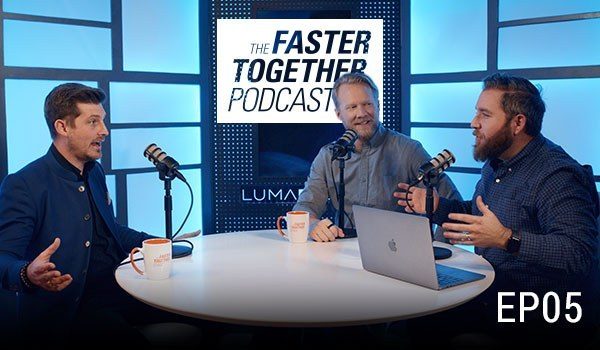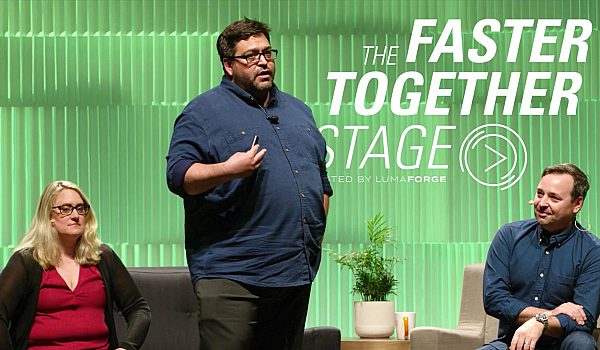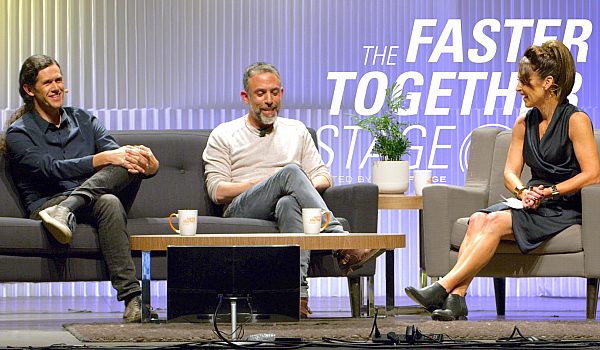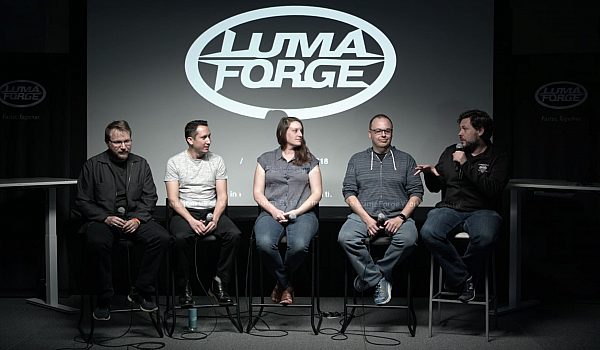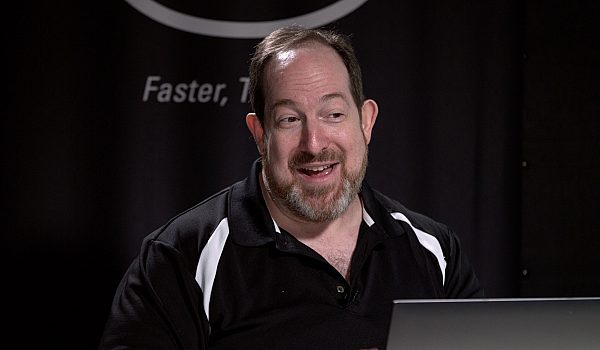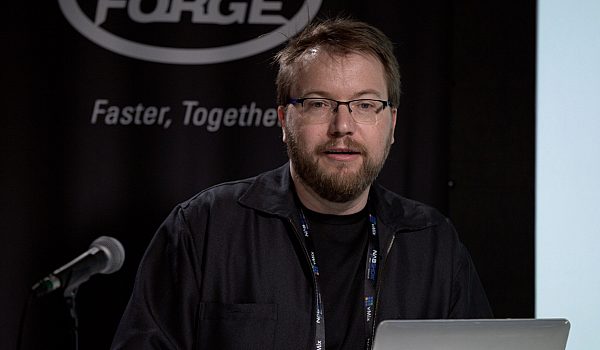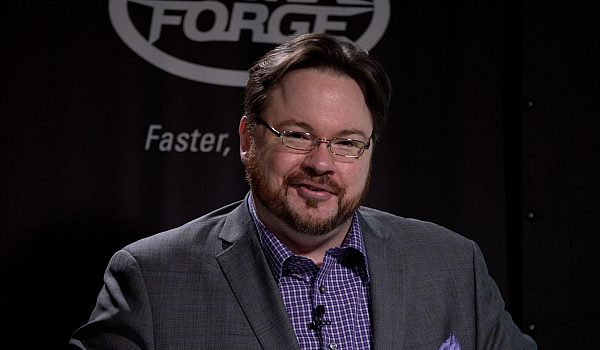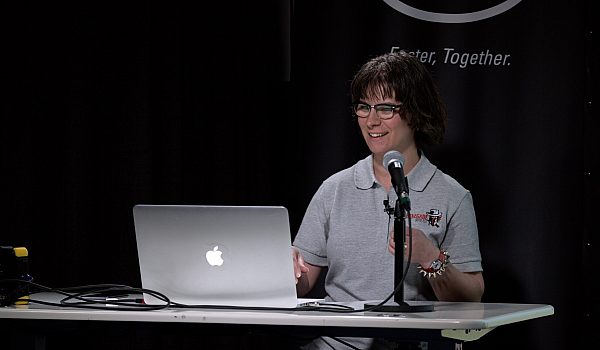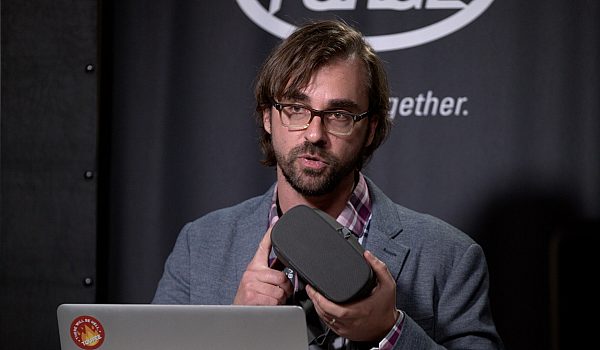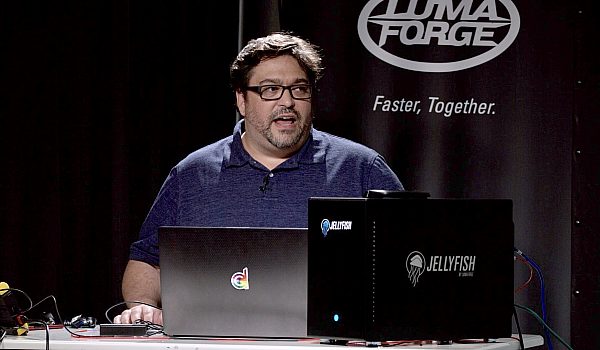Editor, Kyle Reiter, and Assistant Editor, Ernie Gilbert work on the FX channel tv series 'Atlanta' in Adobe Premiere Pro CC. Christine Steele interviews the two men on how they approach sound design & music while editing the tv series in Premiere.
- Hey there. I'm really happy to be with you here tonight, and Adobe has invited two very talented editors to come and speak with us about their work. So please welcome Kyle Reiter and Ernie Gilbert.
- Hi.
- Hi.
- Hi.
- So, Kyle is the lead editor and Ernie is the assistant editor on the smokin' hot series, Atlanta. So, these guys are half the editing team?
- That's right.
- Yeah we have another editor and another assist.
- Another editor and another assist, but you both have been on both seasons.
- That's right.
- And you've just gotten a third season is gonna be happening soon.
- Yeah, we don't know when.
- You don't know when, but you guys are basically doing this incredible work that I love. I think a lot of us have seen the series, it's really fresh, it's really special. And I think that a lot of what's really cool about it is the sound work, the sound design, it makes it really unique. And I think we'd like to talk with you a little bit about the creative freedom you have on that level.
- Sure. I think it's worth mentioning that the show doesn't really have much score to it, we don't have a composer. There is a minor exception, but most of the show, for anyone who hasn't seen it, it's very much about texture and mood, and there aren't a lot of big set pieces, it's not very fast paced, and so it's on us to really beef up the sound, and the music that is in the show is all diegetic, so it sort of sounds as though it's coming from a car, or through a wall. And that's something that we spend a lot of time in the offline edit doing, because we want it to sound right, because that's a really important component to the show.
- Yeah, so, I've noticed that. Most of the episodes, all of the audio is happening on screen.
- Right.
- So if you hear music it's coming through someone's ear buds, or their car, their truck.
- That's right, that's right. And we should say we cut the show in Adobe Premiere Pro and so we have a lot of flexibility with making it sound good in our offline, and maybe that's why we spend a lot of time doing it. We don't wait for mixers to get it to make it sound right, we do it.
- You do it yourself.
- That's right.
- You are so lucky to be able to have that creative freedom, it sounds like your team really supports you, helping craft that feel for the show.
- That's right. Donald Glover, who created the show, and Hiro Murai, who directs a majority of them, they really like being surprised, and so that really gives us the freedom. When they're shooting in Atlanta, we're cutting in Los Angeles. We can really try a lot of different stuff and we can really take some big swings, because they like being caught off guard. And it doesn't always work, but I never feel as though I'm gonna do something that is gonna put them off. You know, because they like, "Oh wow, oh yeah, okay."
- They're open, they want to hear it.
- Absolutely, yeah.
- And how do you two collaborate together?
- I don't know.
- He does all the stuff I don't know how to do, 'cause I'm kind of a nitwit when it comes to the technical stuff.
- We spend a lot of time just talking about maybe pulling music, or sound effects, things that Kyle might need in the edit, me pulling together some options.
- We do a lot, we do all of our VFX in house, so there's a lot of internal turnovers that we're doing to get things prepped. Well also, Ernie, you're humble, but you know, he cut Childish Gambino's "This is America", and clearly you understand
- Yeah, there's a guy even standing up.
- Clearly you understand what your directors and producers are looking for, or rather listening for in--
- Right, I mean, talking about sound specifically, we try to do all of those creative explorations in the offline--
- [Kyle] Right.
- To build out the sound, to let it be a character on the show, so that when we get into mix, because we're a more low-budget cable show.
- We have no money.
- When we get into mix we wanna already have fleshed out what these ideas are.
- [Christine] Right.
- And Premiere, and the tools that we have at our office, let us try those things, explore those things, and then, we know where we're going--
- [Kyle] Yeah, right.
- And the mixers can kind of just take it to the final.
- And they really follow the blueprint you create for them.
- Absolutely, oh yeah, absolutely. I mean, a lot of what we do winds up in, obviously they're doing their due diligence with normalizing and mixing and it sound correctly. But a lot of what we do in the offline winds up in the episode.
- You are so lucky.
- Yeah, yeah.
- Should we show the clip that kinda--
- Yeah, we have stuff to show--
- Yeah, so let's go ahead and show a couple clips, so you brought something that really shows the execution of the diegetic type of audio.
- Yes, that's right.
- Okay, so let's take a look.
- Aw yeah, man, like I was saying, yo, a lot of us are from the south. I'm like, a really big UGK fan, Pimp C, one of the last real prophets, man. That was like the crime mob, Di Farrell Macio days, yeah, those were classic.
- So you into snap music.
- Ha, man, you remember that song, "The Bubblegum"? Yeah, that was my shit. Lovey dovey Yeah, my cousin used to always play that shit.
- [Speaker 1] Matter of fact, hold on. Alright pledge, get the fuck up! Gotta do this dance for our new friends!
- [Speaker 1] Snap, y'all!
- See? Stop, y'all! I gotta go give these pledges a mud bath, y'all need anything from the fridge?
- We're good, man.
- Yeah, we're good, thank you.
- Alright, yeah, cool. Move out!
- That was amazing--
- Yeah--
- We can't follow that up.
- I don't know what to say about that.
- Yeah, no, so that's seen as a good example of a number of things. One, it's very music-heavy, that song was scripted, some of it's scripted, a lot of it we're choosing in the edit, that one specifically was scripted. We also really go out of our way to make music sound bad on the show, kind of much to the dismay of our mixers, where because so much of the music is coming from phones, laptops, cars, it's gotta sound bad, it's gotta--
- So the idea there was he's playing off his phone--
- We took it--
- To the Bluetooth of some--
- Right, so we're in the basement of a frat house, they probably have some sort of PA system that's been totally abused, and it sounds horrible, right? So we're in the mix going: "No, no, that sounds"--
- That sounds too good.
- Yeah, no, it's gotta sound worse. So that's a lot of what we do. And you can also hear in the background we have a party that's playing upstairs.
- I could hear a little bit of that.
- Yeah, and if you watched that episode, further in that scene, once all of the guys leave and it's just Ern and his cousin Alfred there on the couch, they have a very heart-to-heart break-up sort of argument, and the party is continuing throughout. And we sort of use that background sound as score. So we have peaks and valleys, and it's very very subtle, it's things that probably people wouldn't notice, but because we don't have score we sort of use those elements as score.
- And weave that in, yeah.
- That's right. So that's an example of ...
- Yeah, I've noticed that. And we'll speak about how are you creating this funky, it's supposed to not be clean sound. Are you using the essential sound panel ?
- That's right, yeah, we do that a lot. You know, it's simple things like futzing with distortion, room reverb, that sort of thing. I really like being able to keyframe audio effects, I like ... and I can do it without rendering, so a lot of it is just sort of--
- So you really go in there, I mean you're keyframing and you're--
- Oh yeah, well, and in the tools too, they help us to do things very quickly but also very complexly.
- We're able to hit playback, ramp up reverb as it's playing back, "Oh, this is what it sounds like with more reverb," dial it back. So we can dial those things in, and then when you're sitting with Hiro or Donald, you can be on top of levels, and--
- [Kyle] That's right.
- [Christine] Right.
- Yeah, actually, a lot of times when Hiro and Donald are in the room and we're playing back something, I can turn things up and down without interrupting the playback, which I like 'cause it saves me a lot of time.
- And so they're in the room with you, and you're mixing, well, temp-mixing this as you go.
- Yeah, instead of writing down: "This is too loud, that was too quiet," I can do it on the fly--
- [Christine] You're just doing it on the fly.
- And it saves me so much time later, yeah.
- [Christine] So that's a good tool for you guys.
- Yeah, and it's just because there's not a lot of rendering it's a lot of trial and error, honestly.
- And for the songs that are coming through, that are playing, do you get to choose those? Do you have any influence?
- Yeah, quite a bit, yeah.
- Or do they tell you what they want?
- Yeah, things that are modern, like trap music, hip-hop, Donald and his brother Stephen are sort of the go-to for that, but I worked at a record store for a really long time, so I have a pretty good working knowledge of old soul, and jazz, and things like that, so I bring a lot of that to it, and they love it.
- [Christine] And they love it.
- Yeah, yeah, absolutely. We have great music supervisors, who go to Atlanta and talk to young, unsigned kids and try and get their music in the show as well, so it's a very democratic process.
- So, I mean, this music is a really important component even though you're not using it as score?
- That's right, yeah. I mean, we sort of cheat a little bit, we have montages and things like that we're using, but we don't ... Yeah, this is all music that's in the world, and being able to world-ize the music in our cuts.
- Yeah, I think that's what makes it so unique and special, I mean, that combination of introducing us to that, in a way.
- In my opinion it adds a layer of authenticity--
- Right.
- It is, yeah, that's a great word for it.
- 'Cause it's more documentary, you're more in that moment--
- Yeah, it's more authentic.
- Right.
- Rather than a montage at the end of an episode to a Coldplay song or something
- Yeah, yeah, right, right.
- [Ernie] No offense to Coldplay.
- Now you do have some episodes where I've heard music, really interesting music that I think you mentioned were from some local L.A. artist, did you wanna--
- There is one episode from this past season, it was episode 205, the whole episode is Alfred trying to get a haircut from a barber, and the--
- [Ernie] Bibby.
- Bibby is the barber's name. And the whole episode is just the two of them, there's no B-story, we're not cutting away to anything, and it was kind of a difficult one to put together for that reason, so I did something that we'd never done before, I started scoring it with jazz, I started scoring it with old, like--
- [Christine] Nice!
- Hard bop and stuff like that, because it really felt ... it fit the character of Bibby who's very frenetic and crazy, and it sort of helped with the pace of the whole thing. And when Donald saw it, he said: "Oh, this is a great idea, yes, scoring it, I think the jazz thing has sort of been done, maybe." So this is where it helps to have Donald as your show runner. He texted Thundercat and Flying Lotus, who are two L.A. musicians who are sort of--
- Oh, nice, yeah.
- Like, experimental hip-hop
- Thundercat's like, an amazing bass player ...
- He was like, how will we use these guys?
- Yeah, he was like: "Hey, can you score this episode?" And they were like: "Yeah, sure." And they came in the next day and watched it, and then a week later we had a score, and it was like, oh, okay, I guess it's that easy when you're Donald Glover, you can just text geniuses, yeah.
- Could we see that clip?
- Oh yeah, we have that clip.
- Yeah, we can show that.
- Yeah, let's do that.
- That's my ride!
- Hey, you don't think she'd call the police, do you?
- I'm still on probation, nigga, so I hope the fuck not.
- Nah, she ain't doin', we alright, it's all good.
- Do I even have to say it, Bib?
- We should probably just head--
- Should probably head back to the shop, right?
- Probably just head on back to the shop, yeah, okay.
- That's right.
- Imma take you right on back, get you cut off real quick. I got you, paper boy. Oh hell no!
- Bibby, goddammit man, what you doing?
- It's okay.
- Fucking two pigs, man, shit! How you gonna do that when I ain't got no seatbelt on, nigga?
- doing the seatbelt all the time.
- Yeah, no shit, why is your seat ... Man, Bibby, fuck you.
- that one don't work good.
- Shit.
- Lamar!
- So that's atypical, but that's another example.
- You're saying that is atypical, that's not--
- That's the only episode that we've ever put score in.
- Oh, the only one?
- Like, actual composed score.
- But I think you were, that was a great choice that you made, because it really helped it move along, I mean, there was so much ... Like, we'd heard that conversation between them, I loved that episode actually.
- Okay, well I'm lucky enough to work on a show where I can make that choice if I want to and they go with it, so ...
- Oh, that's the dream.
- Yeah.
- You guys both do such creative work, and I'm so inspired by your editing, and--
- [Kyle] Oh, thanks.
- I really appreciate you coming here tonight.
- No, thanks for having us, it was great, yeah.
- And sharing this with us.
- Yeah, yeah. I love talking about the show, so I'm ...
- That's great.
- Thanks.
- Thank you both.
- Yeah, okay, thanks so much.
- Thank you so much.
- Thank you.


 Mobile
Mobile
 Tower
Tower
 R24
R24
 Builder
Builder
 Manager
Manager
 Connect
Connect
 Kyno
Kyno
 Media Engine
Media Engine
 Remote Access
Remote Access
 Support
Support
